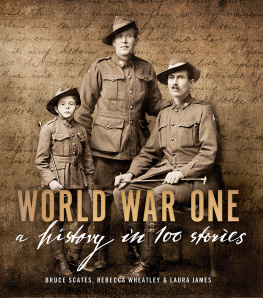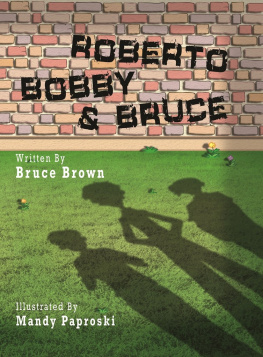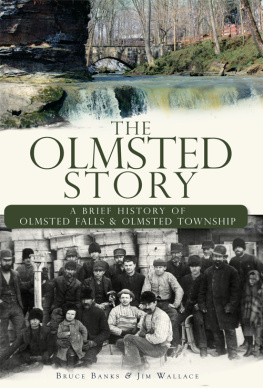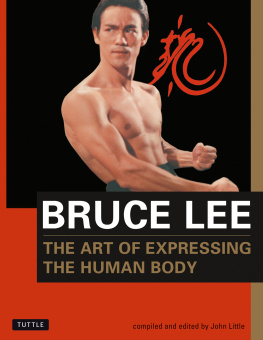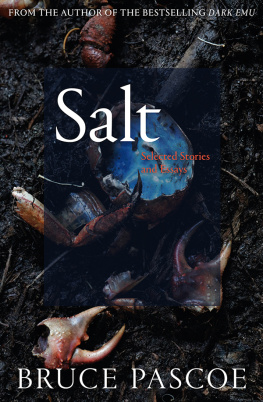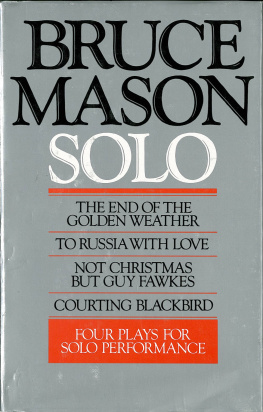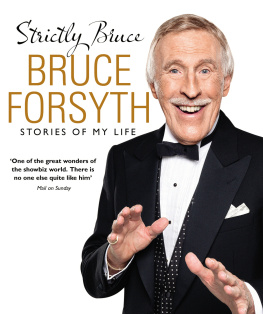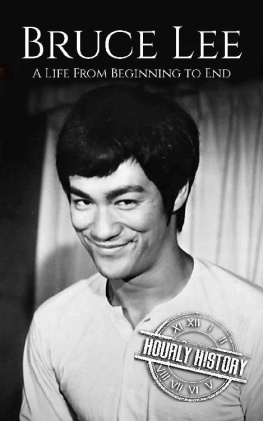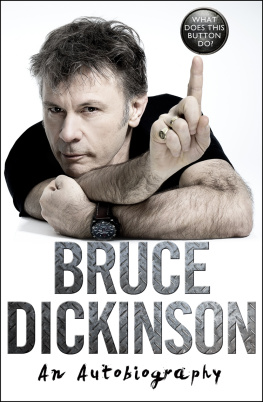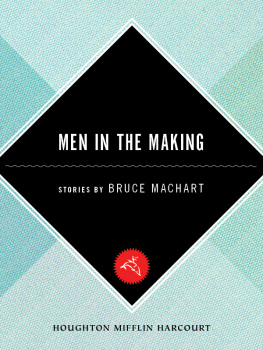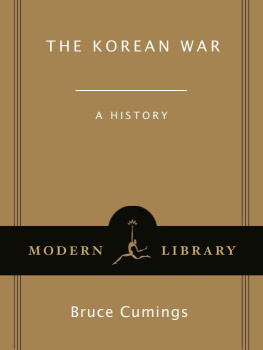Bruce Scates - World War One: A History in 100 Stories
Here you can read online Bruce Scates - World War One: A History in 100 Stories full text of the book (entire story) in english for free. Download pdf and epub, get meaning, cover and reviews about this ebook. year: 2016, publisher: Viking Australia, genre: History. Description of the work, (preface) as well as reviews are available. Best literature library LitArk.com created for fans of good reading and offers a wide selection of genres:
Romance novel
Science fiction
Adventure
Detective
Science
History
Home and family
Prose
Art
Politics
Computer
Non-fiction
Religion
Business
Children
Humor
Choose a favorite category and find really read worthwhile books. Enjoy immersion in the world of imagination, feel the emotions of the characters or learn something new for yourself, make an fascinating discovery.
- Book:World War One: A History in 100 Stories
- Author:
- Publisher:Viking Australia
- Genre:
- Year:2016
- Rating:4 / 5
- Favourites:Add to favourites
- Your mark:
- 80
- 1
- 2
- 3
- 4
- 5
World War One: A History in 100 Stories: summary, description and annotation
We offer to read an annotation, description, summary or preface (depends on what the author of the book "World War One: A History in 100 Stories" wrote himself). If you haven't found the necessary information about the book — write in the comments, we will try to find it.
World War One: A History in 100 Stories — read online for free the complete book (whole text) full work
Below is the text of the book, divided by pages. System saving the place of the last page read, allows you to conveniently read the book "World War One: A History in 100 Stories" online for free, without having to search again every time where you left off. Put a bookmark, and you can go to the page where you finished reading at any time.
Font size:
Interval:
Bookmark:
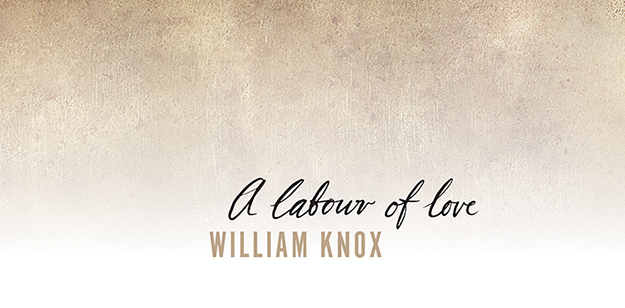
This is the final story in this book. And it might have been told in a dozen different ways.
William Johnstone Knoxs story might have been about duty. Knox had served as a lieutenant in the Australian Field Artillery prior to the outbreak of war. He felt a deep obligation to serve and boarded a troopship a few months after his first and only child was born. Bill Knox left a young wife and his baby daughter behind him, a promising career in business, and political interests as well. Like hundreds of young men who put themselves forward, what he saw as his duty to his country and his King outweighed any thought of personal safety. Knox was a man destined to go to war.
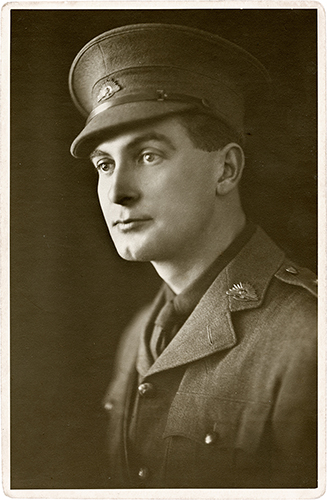
What he saw as his duty: Bill Knox cuts a fine figure in his uniform. He would look very different after just a years campaigning. Courtesy Kate Baillieu.
By the same token, Knoxs story might have been about privilege. The son of a successful businessman and the first Federal Member for Kooyong, he was raised at Ranfurlie, a stately home in East Malvern, one of Melbournes wealthiest suburbs. He was educated at Scotch College, one of Melbournes most expensive and elite public schools. He gave his address on his attestation papers as the Melbourne Club, Melbournes most exclusive private club. But Bill Knox was also a man who made his own way in the world. Expected to fend for himself the moment his education was completed, he struggled to keep his wife and child in a manner thought appropriate for middle-class society. Knox was not one of the idle well-to-do, but a man of enterprise, integrity and industry; a gentleman who went to fight an ungentle war.

Putting himself forward: Bill Knox leads his men through the streets of Port Melbourne en route to the transport ships. The streetscape of the town is still recognisable today. Courtesy Kate Baillieu.
Knoxs story could have been about endurance. He would train in Egypt, fight on the slopes of Gallipoli, see action in France at Fromelles, Pozires, Messines, and along the Ypres Salient. An artillery officer, he went with his guns into the thick of the fighting. Teams of horses laboured to drag them into position, caked (he wrote) in frozen mud or trudging across desert sands. Bill Knox would witness some of the wars most savage fighting on the peninsula and in Flanders and the Somme. Gallipoli was just one of several punishing campaigns: we only have 500 acres at Anzac and they can pump shells into any part of it.
And Knoxs story might have been about courage. In August 1917, his battery came under heavy shellfire from enemy lines. At great personal risk from exploding ammunition he extinguished a fire threatening to engulf his position. He was awarded the Military Medal for conspicuous gallantry in the field.
Like many of the stories in this book, Knoxs might also have been about loss. He was killed in the push on Passchendaele in 1917. It might have been about pain and injury; his legs and chest were eviscerated by a high explosive shell and it would take the young man over twenty-four hours to die. Or it might have been about remembrance. William Johnstone Knox was commemorated in church, school and community; his name was carved in the polished blackwood of Melbourne Stock Exchanges Honour Roll; almost a hundred years after his death, he is still held up as an example to us all.
Bill Knoxs story is all these things and more. But it is something far more intimate as well. All said and done, this story is about love.
Bill Knox loved the men who served beside him. It was not just the enduring friendship forged with fellow officers, decent chaps he shared a tent or a dugout with, a really good lot those fellows. Far from home, the young Knox acted as a surrogate father for the men who served beneath him. He cared for their welfare, wrote to their families, even brought them extra rations. And nothing was more hurtful to him than the loss of one of his boys. Knox wrote to his wife at the beginning of 1917:
I lost two of my best men yesterday Feltham and Robinson (the latter the little chap I asked you to send some foodstuffs to). They got blown up by a shell when returning from down near front line yesterday. Feltham was one of the best fellows in the world cheery and popular with everyone. Young Robinson I told you about before It just so chanced that it was a sticky job and I picked two of the best for it and lost them I am very sad about it and a bit upset & nervy tonight I sent out & got them brought in to bury near the Battery. I couldnt get a Padre so I had to read the burial service myself. The most trying thing I have ever done and more so as we were under heavy shellfire at the time I was very fond of those two lads and wanted to do what I could for them properly Fritz just commenced to hot us up with heavy stuff though I had tried to pick a quiet time... I had just commenced to read the service when we got it right and left... This is the way two fine brave lads went out and I am very sad and had to write their people tonight... It is desperately cold snowing for four days & now frozen hard and an icy wind blowing that almost cuts one in half...
Knox loved his baby daughter, Diana, a child he would never really come to know. He addressed her as his Bubby Kins and always carried a photograph of her. In the close world of the trenches, he would stare at that image for hours on end, willing it somehow to life: I love that lovely little snap of her. The really nice one with her mouth all pursed up in readiness for a smile and looking a picture of mischief.
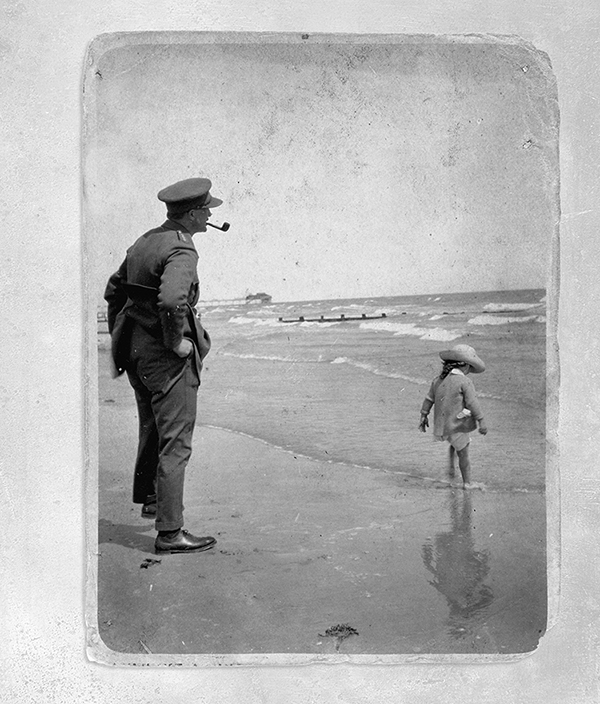
A child he never really came to know: Bill watches his Bubby kins test the water at Bognor. From the seaside resort you could just about hear the guns booming from across the channel. This was Bills last leave. Courtesy Kate Baillieu.
And he loved his wife, a love that sustained him through the chaos and brutality erupting all around him. Throughout the war, Bill Knox wrote to Mildred on an almost daily basis. He described the horrors of the battlefield, the terror of the fighting, but also the love that kept him sane. Every letter to Mim brims with intimacy and affection. She was his dearest girl, his dear old sweetheart, the most splendid perfect wife. Mim would read every letter time and again, put them carefully away, treasure their presence that reminder of him in her household. And in 1916, at great risk and expense, Mim and Diana travelled all the way to England. They spent a few precious weeks with Bill on Blighty leave from France. The three of them walked the pebbled beach at Bognor; the only memory Diana had of her father was being lifted high up on his shoulders in the crisp sea air.
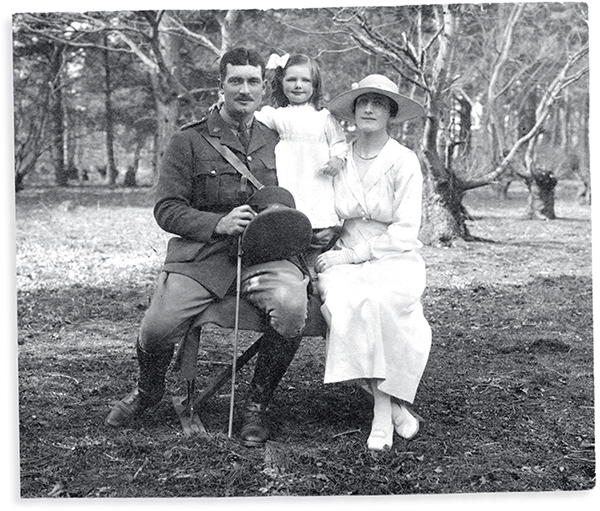
A love that sustained them: Diana, Mildred and Bill Knox in a stretch of woodlands in the south of England. At the time the photograph was taken Diana was barely two years old. Mother and daughter had crossed the world to be reunited with Bill. They shared just a few weeks together before being separated forever by war.
Font size:
Interval:
Bookmark:
Similar books «World War One: A History in 100 Stories»
Look at similar books to World War One: A History in 100 Stories. We have selected literature similar in name and meaning in the hope of providing readers with more options to find new, interesting, not yet read works.
Discussion, reviews of the book World War One: A History in 100 Stories and just readers' own opinions. Leave your comments, write what you think about the work, its meaning or the main characters. Specify what exactly you liked and what you didn't like, and why you think so.

